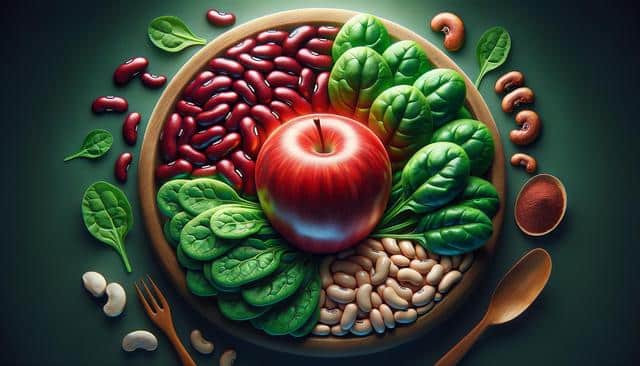3 Nutrient-Rich Foods That May Support Kidney Health
To maintain kidney function, foods like cranberries, cauliflower, and fatty fish may help. These contain anti-inflammatory compounds and low sodium levels, supporting detoxification and reducing the strain on kidneys without compromising taste.

Cranberries: A Tart Boost for Urinary Tract and Kidney Health
Cranberries are widely recognized for their potential benefits in supporting urinary tract health, but they may also play a role in maintaining kidney function. These small, tart berries contain a variety of plant compounds, including proanthocyanidins, which can help prevent harmful bacteria from adhering to the urinary tract lining. This may reduce the risk of infections that could otherwise strain the kidneys.
Furthermore, cranberries are low in potassium and sodium, making them a kidney-friendly food for individuals monitoring their intake of these minerals. They also contain antioxidants that help reduce inflammation, a key factor in preserving kidney health over time. Here are a few practical ways to incorporate cranberries into your routine:
- Add unsweetened dried cranberries to oatmeal or yogurt.
- Use cranberry juice (with no added sugar) as a base for smoothies.
- Mix fresh cranberries into baked goods or homemade sauces.
While cranberries are a beneficial choice, it’s important to consume them in moderation, especially in juice form, to avoid excess sugar.
Cauliflower: A Versatile Vegetable with Kidney-Friendly Nutrients
Cauliflower is a cruciferous vegetable that’s both adaptable in the kitchen and supportive of kidney health. Rich in vitamin C, folate, and fiber, cauliflower offers anti-inflammatory benefits and helps the body eliminate toxins more efficiently. Its low potassium and phosphorus content makes it suitable for individuals with kidney concerns, particularly those managing chronic kidney conditions.
One of cauliflower’s strengths is its versatility. It can be mashed, roasted, or even used as a low-carb substitute for rice or pizza crust. This makes it an easy addition to a kidney-conscious eating plan. Some simple ways to enjoy cauliflower include:
- Steaming and seasoning with herbs for a quick side dish.
- Blending into soups for added creaminess without dairy.
- Creating cauliflower rice as a lighter base for meals.
Because it’s naturally low in sodium and high in plant-based nutrients, cauliflower can help reduce inflammation and support the body’s detoxification processes, potentially easing the workload on the kidneys.
Fatty Fish: Omega-3s for Inflammation and Circulatory Support
Fatty fish like salmon, mackerel, and sardines are rich in omega-3 fatty acids, which are known for their anti-inflammatory properties. Chronic inflammation can contribute to kidney damage over time, so including foods that help to manage inflammation may support long-term kidney function. Omega-3s also promote heart health, which is closely linked to kidney well-being.
In addition to healthy fats, fatty fish are a source of high-quality protein, which is often recommended in controlled amounts for kidney health. Eating moderate portions of fatty fish can help meet protein needs without overburdening the kidneys. Consider these tips for including fatty fish in your diet:
- Grill or bake fish with herbs and lemon for a simple meal.
- Use canned fish packed in water for easy salads or sandwiches.
- Incorporate small portions into grain bowls or wraps for a balanced lunch.
As with any protein source, portion size matters. Those with existing kidney concerns should consult a healthcare provider about appropriate protein intake, but for many, fatty fish can be a smart choice for both kidney and overall health.
Why Low-Sodium and Anti-Inflammatory Choices Matter
One of the main goals in supporting kidney function through diet is to reduce the strain on these vital organs. High sodium intake can lead to elevated blood pressure, which is a significant risk factor for kidney disease. Similarly, inflammation can impair kidney function over time. Choosing foods that are naturally low in sodium and rich in anti-inflammatory compounds is an important strategy for maintaining kidney health.
In addition to cranberries, cauliflower, and fatty fish, there are other foods that fit this profile, such as:
- Blueberries, another fruit rich in antioxidants.
- Red bell peppers, which are low in potassium and high in vitamins.
- Garlic, known for its flavor and potential anti-inflammatory effects.
Maintaining a diet that emphasizes whole, plant-based foods and healthy fats while moderating protein and sodium levels can help create a supportive environment for kidney function. Hydration also plays a vital role, as adequate water intake helps the kidneys flush out waste efficiently.
Making Sustainable Dietary Changes for Kidney Support
Adopting a kidney-friendly eating pattern doesn’t mean sacrificing flavor or variety. In fact, many of the foods that support kidney health are also flavorful and easy to prepare. The key is to focus on whole foods, limit processed items high in sodium and additives, and find enjoyable ways to prepare meals that align with your health goals.
Here are a few strategies for building sustainable habits:
- Plan meals ahead to include a variety of kidney-supportive ingredients.
- Experiment with herbs and spices to enhance flavor without added salt.
- Stay informed about your specific dietary needs, especially if you have a preexisting kidney condition.
Small, consistent changes are often the most effective. By incorporating foods like cranberries, cauliflower, and fatty fish into your regular meals, you’re taking proactive steps toward supporting your kidney health in a way that’s both practical and enjoyable.
Conclusion: Supporting Kidney Health Through Thoughtful Nutrition
Maintaining healthy kidney function is influenced by many factors, and nutrition plays a central role. Including foods like cranberries, cauliflower, and fatty fish in your diet can contribute to overall kidney wellness thanks to their anti-inflammatory properties and low sodium content. Whether you’re looking to prevent issues or manage existing concerns, being mindful of the foods you choose can make a meaningful difference. By focusing on simple, nourishing ingredients, you can support your kidneys while enjoying meals that are both satisfying and health-conscious.